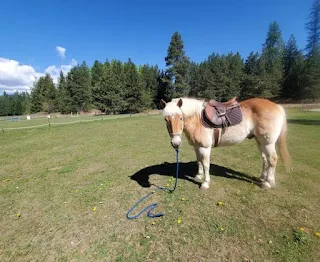Below are some basic questions to ask regarding your horse’s health.
I suggest keeping a horse health journal making note of diet changes, farrier care, odd behaviors, etc. It can be used as a future reference point to learn from and find what works best for the horse.
Taking pictures from both profiles, front, and rear every six months can also be a good reference.
For those who experience dramatic seasons and environmental changes and for those who have had the same horse(s) for a long time, patterns often occur out of convenience in the horse’s maintenance program.
As the horse gets older possible adjustments may need to be made to the program.
What is the general condition of your horse's mane and coat?
Weight-wise does your horse look consistent or does he look like he is carrying extra weight or pockets of fat, especially along his neck and hindquarters?
What does your horse's hoof condition look like?
Do you notice if there are changes or ridges on the outside of the hoof?
Have you taken pictures from the front, rear, and behind, and then compared them after six months?
Have you measured how large your horse's feet are? The easiest thing to do is place the hoof on a sheet of paper and trace it. Six months later how does it compare to the previous tracing?
Have you watched your horse chew his hay and/or grain and noticed if any bits fall out of his mouth or odd movement in his jaw?
Have you assessed his manure to see if food is not breaking down properly when he is chewing?
Have you ever done a fecal count, checking for worms and Parasites?
If you keep your horse at home, are you able to rotate the pasture where he lives, and discard old manure?
Have you assessed your horse's current work program in correlation to his current feed program and do you make adjustments throughout the season?
Even if you went through the challenge of saddle fitting at some point in owning your horse, especially for those with younger horses and older horses whose bodies wind up changing quite rapidly in a short period, have you reassessed if your equipment is still fitting as well as possible?
Have you noticed any soreness in your horse after certain types of work whether is changes in terrain, length of time, etc?
Have you noticed any behavioral differences in your horse's attitude and mentality towards you depending on what work you've been asking of him?
Do you ever see your horse roll all the way over or does he roll on one side, stand up, then roll on the other?
If your horse has experienced physical trauma, have you had a quality chiropractor or any other bodyworker assess them?
Have you seen your horse lay down and sleep regularly?
Does your horse seem relaxed in his pasture or stall or is he always on alert?
If you have a mare, does she have extreme heat cycles?
Have her ovaries been examined for cysts and other issues?
Most folks treat their own health as a reactionary "issue." Unfortunately, the same approach is frequently used with horses. By prioritizing watching your horse’s behavior, and physical movement, you'll familiarize yourself with his norm and recognize if his behavior changes.
Unfortunately, most horses I meet have pain issues that humans have mistook as behavioral problems. The healthier and more comfortable we can keep our horses, the more available they are to interact with us in a willing and reasonable manner.


No comments:
Post a Comment
Thank you for visiting my blog and leaving a comment!
Sam